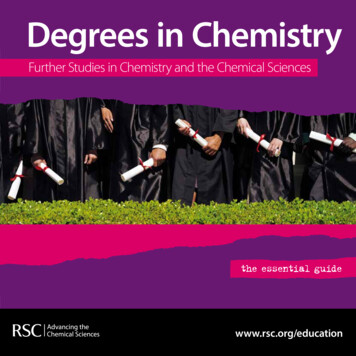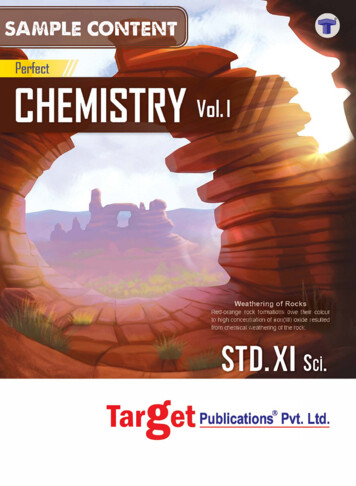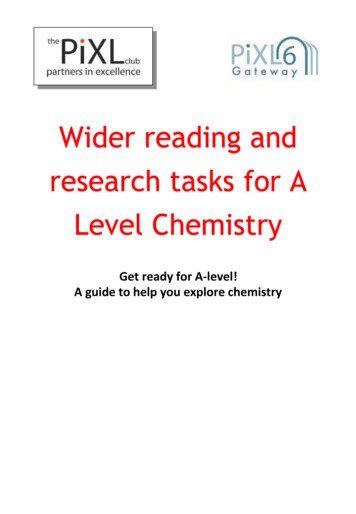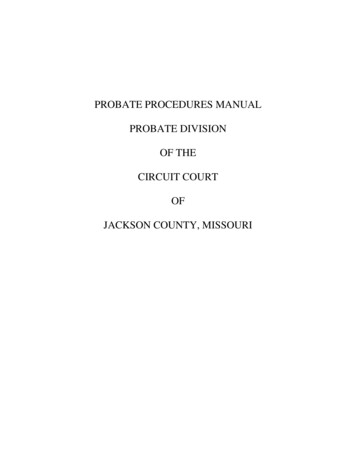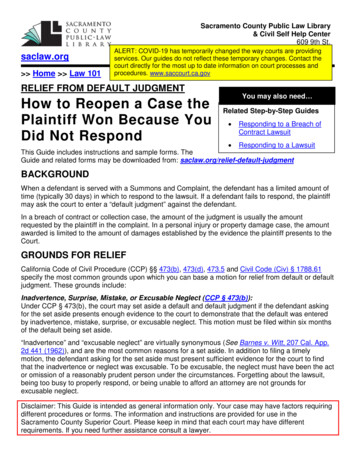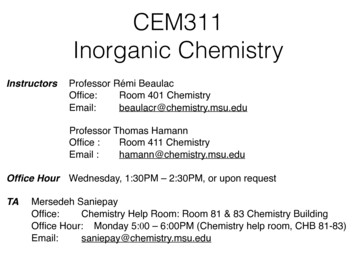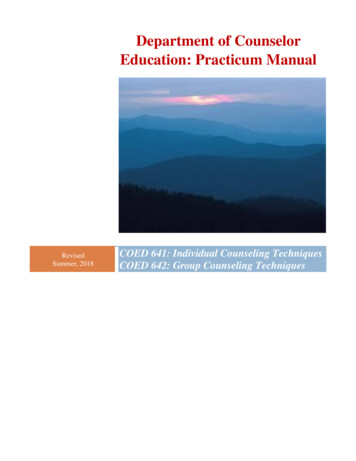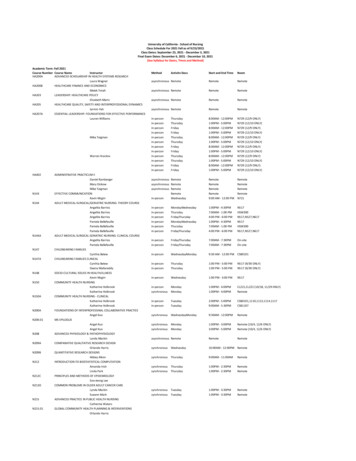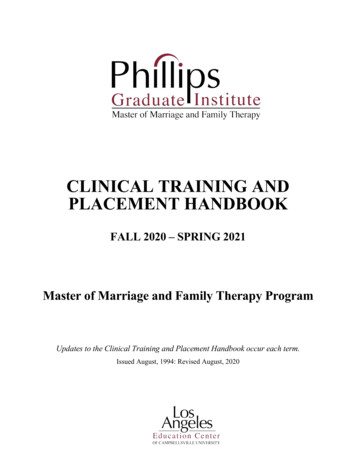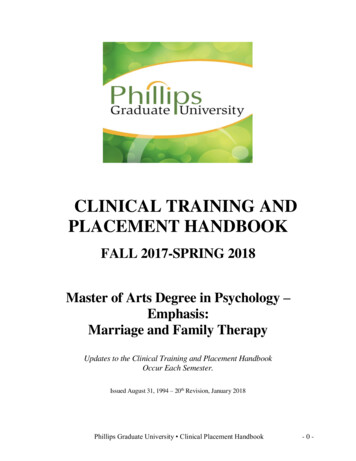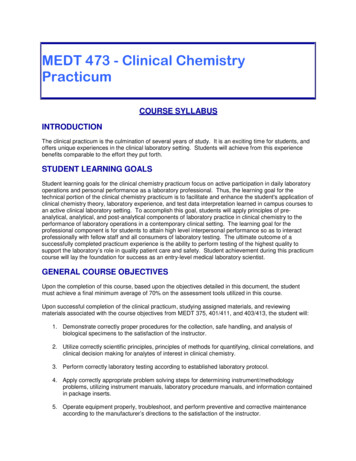
Transcription
MEDT 473 - Clinical ChemistryPracticumCOURSE SYLLABUSINTRODUCTIONThe clinical practicum is the culmination of several years of study. It is an exciting time for students, andoffers unique experiences in the clinical laboratory setting. Students will achieve from this experiencebenefits comparable to the effort they put forth.STUDENT LEARNING GOALSStudent learning goals for the clinical chemistry practicum focus on active participation in daily laboratoryoperations and personal performance as a laboratory professional. Thus, the learning goal for thetechnical portion of the clinical chemistry practicum is to facilitate and enhance the student's application ofclinical chemistry theory, laboratory experience, and test data interpretation learned in campus courses toan active clinical laboratory setting. To accomplish this goal, students will apply principles of preanalytical, analytical, and post-analytical components of laboratory practice in clinical chemistry to theperformance of laboratory operations in a contemporary clinical setting. The learning goal for theprofessional component is for students to attain high level interpersonal performance so as to interactprofessionally with fellow staff and all consumers of laboratory testing. The ultimate outcome of asuccessfully completed practicum experience is the ability to perform testing of the highest quality tosupport the laboratory’s role in quality patient care and safety. Student achievement during this practicumcourse will lay the foundation for success as an entry-level medical laboratory scientist.GENERAL COURSE OBJECTIVESUpon the completion of this course, based upon the objectives detailed in this document, the studentmust achieve a final minimum average of 70% on the assessment tools utilized in this course.Upon successful completion of the clinical practicum, studying assigned materials, and reviewingmaterials associated with the course objectives from MEDT 375, 401/411, and 403/413, the student will:1. Demonstrate correctly proper procedures for the collection, safe handling, and analysis ofbiological specimens to the satisfaction of the instructor.2. Utilize correctly scientific principles, principles of methods for quantifying, clinical correlations, andclinical decision making for analytes of interest in clinical chemistry.3. Perform correctly laboratory testing according to established laboratory protocol.4. Apply correctly appropriate problem solving steps for determining instrument/methodologyproblems, utilizing instrument manuals, laboratory procedure manuals, and information containedin package inserts.5. Operate equipment properly, troubleshoot, and perform preventive and corrective maintenanceaccording to the manufacturer’s directions to the satisfaction of the instructor.
6. Utilize proper techniques in the performance of all laboratory testing to the satisfaction of the instructor.7. Evaluate correctly laboratory test results to determine disease diagnosis.8. Evaluate correctly acceptability of quality control and test result data.9. Discuss the impact and apply principles of total quality management on laboratory operations, including relevance tothe pre-analytical, analytical, and post-analytical stages of the testing process.10. Comply with established safety regulations and regulations governing regulatory compliance related to laboratorypractice to the satisfaction of the instructor.11. Assess correctly critical pathways to facilitate diagnosis and to determine additional testing as warranted.12. Communicate effectively and professionally as a member of the healthcare team to enable consultative and educationalinteractions with other healthcare personnel, the public, and patients to the satisfaction of the instructor.13. Demonstrate ethical behavior and professionalism, including maintaining the confidentiality of patient information tothe satisfaction of the instructor.14. Participate in continuing education as opportunities arise for one’s own professional career development to thesatisfaction of the instructor.OUTCOME EXPECTATION FOR STUDENTS BASED ON UNIVERSITY, PROGRAM,AND COURSE STUDENT LEARNING GOALS AND OBJECTIVESThe student learning goals and objectives, as stated for MEDT 473 Clinical Chemistry Practicum, provide the foundation forstudent achievement of the Medical Laboratory Science Program’s student learning goals and objectives. Achievement of theProgram’s combined goals and objectives is necessary for students to gain the knowledge needed to be successful entry-levelmedical laboratory scientists, as well as successful on passing the Board of Certification national examination. Additionally, theMedical Laboratory Science Program’s student learning goals and objectives support student accomplishment of the University’sgeneral education goals for undergraduate students. The University’s general education goals support a comprehensiveunderstanding of the liberal arts and sciences, fostering student development for success in an increasingly challenging globalsociety. The synergy for this collaborative educational effort is expressed in the table entitled “University and MLS ProgramEducational Goals and Objectives”.
University and MLS Program Educational Goals and ObjectivesUNIVERSITYGENERAL EDUCATION GOALSMLSPROGRAMOBJECTIVES,SUPPORTINGGEN EDGOAL(S)GED ED #:1-Read critically, analyze arguments & information,51-Demonstrate proper procedures for the collection of safe1-Communicate effectively in writing, orally, &through creative expression.25-Utilize scientific principles (e.g. physiology, immunology,biochemistry, molecular biology, genetics, microbiology, etc.),laboratory principles and methodologies for the clinical setting.22353-Perform laboratory testing with accuracy.3& engage in constructive ideation.-Work collaboratively & independently within &across a variety of cultural contexts and a spectrumof differences.MEDICAL LABORATORY SCIENCE PROGRAMEDUCATION OBJECTIVEShandling & analysis of biological specimens.MEDT473COURSEOBJECTIVE(S)SUPPORTINGMLS EDOBJECTIVESCOURSE OBJ#4-Critically evaluate the ethical implications of1,34-Evaluate problems that impact on laboratory services and take45-Reason quantitatively, computationally, and1,55-Operate equipment properly, troubleshoot, and perform556-Utilize proper technique in the performance of all laboratory61,5-Interpret clinical significance, clinical procedures, & laboratorytest data accurately.51,58-Evaluate laboratory data using statistical analysis.9-Apply principles of continuous assessment to all laboratorywhat they say and 31,31,3corrective action.preventive and corrective maintenance.testing.7services.2, 7,1189109-Comply with established laboratory safety regulations ®ulations governing regulatory compliance related to laboratorypractice.111012121313, 14-Utilize principles of quality assurance and quality improvementfor all phase of laboratory services (i.e. pre-analytical, analytical, &post-analytical).-Communicate through oral and written skills effectively &professionally to enable consultative & educational interactionswith healthcare personnel, the public, & patients in order tofunction successfully as a member of the healthcare team.-Demonstrate ethical behavior & professionalism, maintainconfidentiality of patient information, & participate in continuingeducation for one’s own professional career development.14-Apply principles of educational methodology to educateN/A15-Evaluate published scientific studies utilizing knowledge ofN/Aproviders & users of laboratory services.research design.1611-Demonstrate a commitment to the future of medicallaboratory profession through involvement in a nationalprofessional society.17N/A18N/A19N/A20-Demonstrate an understanding of the impact of globalizationN/A-Apply principles & concepts of laboratory operations to criticalpathways and clinical decision making, performance improvementdynamics of healthcare delivery systems in relationship tolaboratory services, human resource management & financialmanagement.-Demonstrate an understanding of human creativity & ofvarious types of aesthetic & intellectual expression through study ofthe liberal arts.- Demonstrate an understanding of the significance of culturaldiversity as exhibited within the United States through study of theliberal arts including completion of a multicultural course.on society through study of the liberal arts.
COURSE DETAILSThis is a clinical practicum course, and it will meet at a clinical affiliate to be determined by the Universityinstructor. Students will be notified of this location prior to the commencement of the clinical practicum.Attendance at all clinical practicums is MANDATORY, and missed time must be rescheduled withthe date/time at the discretion of the clinical instructor and the University instructor. hedule/for further details about attendanceexpectations.Instructor: Karen R. Brinker, M.Ed., MLS(ASCP)CM303 D Willard Hall Education BuildingPhone: 302-831-6502Email: kcchem@udel.eduMODES OF INSTRUCTIONClinical faculty will utilize various methods of instruction, including but not limited to a combination of: Clinical specimens Quality control materials Chemistry automated analyzers Assay of CAP survey samples previously analyzed and stock samples Case studiesStudents will receive instruction about proper operation of equipment, specimen processing, qualitycontrol, use of the LIS, and result interpretation and reporting mechanisms specific to the clinical facilitywhere they are assigned.METHODS OF ASSESSMENTUpon the completion of this course, based upon affective, cognitive and psychomotor objectives, thestudent must achieve a final minimum average of 70% (C-) on the assessment tools utilized in thiscourse.The clinical instructor will administer written quizzes. In addition, the clinical instructor will assign papersor projects that are relevant to the practicum. This component of the Evaluation comprises 40% of thepracticum grade.A practical examination is another means of assessment employed by the clinical instructor. Theinstructions and rubric for the practical examination will be provided to the student prior to commencingthe practical examination. The clinical instructor will complete the practical grading rubric and will return itto the University instructor. This component of the Evaluation comprises 40% of the practicum grade.Affective assessment is incorporated into the mid- and final-evaluation process. A mid-evaluation will becompleted by the clinical instructor and will be discussed with the student. If there are any issues to beaddressed, this will also be shared with the University instructor. The final MEDT 473 Clinical ChemistryPracticum Evaluation will be completed by the clinical instructor and discussed with/reviewed by thestudent. The affective component on the final Evaluation comprises 20% of the practicum grade.A written final examination will be administered by the University instructor at the conclusion of thepracticum. The University-administered written final examination component of the Evaluation does notaffect the practicum grade, but is included on the form.A sample MEDT 473 Clinical Chemistry Practicum Evaluation can be found at the end of this syllabus.
Additional RequirementsJournals are one of the most frequently prescribed methods of reflecting on lifetime experiences. Eachstudent is required to maintain a journal for each clinical practicum period. The student may record thesequence of daily events, as well as unusual or memorable situations or events that transpired andhow he/she reacted to them. Think about what happened. How would you react the next time youencounter a similar situation? Or perhaps provide a commentary about a particular laboratoryemployee or environment that you encounter. Think about how your day impacted you professionally.Write regularly and record the date of each entry. Adhere to HIPAA and confidentiality guidelines; donot disclose any identifying facts or information. For more information and guidelines for the journal,see: ation/Paperwork documenting attendance and orientation to the affiliate institution must besubmitted to the University instructor at the conclusion of the practicum. Note that theattendance sheet must be signed by the Clinical instructor prior to completion of the practicum.Site evaluations are a tool used by the Clinical and University instructors to assess the achievement ofthe clinical practicum experience and the academic preparation for it. Students are required to submit acompleted Site Evaluation for each clinical practicum to the University instructor. These will be collatedby affiliate institution and discipline, and will be provided in an anonymous format to the Clinicalinstructors during the summer following completion of the clinical practicums. Comments regardingacademic preparation will be shared and discussed with the University instructors, and used to enhancethe curriculum as indicated. Please complete these in a professional, constructive manner.COURSE PREREQUISITESMEDT 403/413RESTRICTIONS:Open to medical laboratory science majors only.TEXTBOOKS AND OTHER RESOURCESOne of the following review books is required for all clinical practicums senior year and should be takendaily to your clinical practicum sites for review during slower periods:Ciulla AP, Lehman DL. Success! In Clinical Laboratory Sciences. 4th ed. Upper Saddle River, NJ:Pearson Education, Inc.; 2010. ISBN: 978-0-13-512648-6Tanabe, Patricia A., Holladay, E. Blair., eds. BOC Study Guide: Clinical Laboratory CertificationExaminations. 5th ed. Chicago, Ill. : American Society For Clinical Pathology, 2014, c2009. Print.ISBN: 978-089189-5879Students should refer to the textbook and lecture and laboratory course materials from MEDT 375, MEDT401/411, and MEDT 403/413. Students are expected to review these materials in preparation for thisclinical practicum experience. In addition, students are expected to use these materials as resourcesduring this practicum, as well as in preparation for the written final examination.Students also have access to the reference library at the affiliate institution. This library provides studentsaccess to journals and medical-related books.Through the University of Delaware, students have online access to DELCAT – UD’s library online cataloghttps://library.udel.edu/.
DRESS CODEAll University of Delaware Medical Laboratory Science majors assume responsibility for their own attirewhile in the clinical setting. Each site has established guidelines for employee/students. In addition toabiding by the guidelines of the site at which the rotation occurs, each student must adhere to the followingminimum guidelines of the University of Delaware Medical Laboratory Science Program described below. Navy medical scrub uniforms are required. Clothing must be neatly pressed and colors must match.Hose or socks are required when wearing pants. White shoes are recommended; flat shoes arerequired. Cloth or open-toed shoes, jeans, t-shirts and sweatshirts are not acceptable. A clean, pressed white labcoat is required unless otherwise specified by the clinical site. AUniversity of Delaware pin with your name, denoting status as a University of Delaware student,must be worn at all times while at the clinical affiliate sites. Hair styles which extend below the shoulder must be tied back. For safety reasons, most jewelry is limited. Small post earrings that do not extend below the earsare acceptable, long necklaces or dangling bracelets are not. Facial, ear cartilage and tonguepiercings must be removed while at the affiliate institution. Tattoos that are visible must be covered. The various clinical sites may have additional dress code requirements. The student must adhere toany additional requirements at that site. Safety glasses must be worn at all times while in the clinical laboratory.Each student is expected to present a professional appearance and attitude at all times. NOEXCEPTIONS!!ACADEMIC HONESTYHonesty is essential in the profession of Medical Laboratory Science. You are encouraged to becomefamiliar with the UD Student Guide to University Policies http://www.udel.edu/stuguide/current . Thecontent of the handbook applies to this course. If you have any questions about this policy please consultwith the instructor.ACADEMIC SERVICESThe University of Delaware offers a variety of academic services for students. These services includecoordinating tutoring sessions, providing academic skills workshops, and providing assistance forstudents with ADHD and learning disabilities. Students are encouraged to contact the AcademicEnrichment Center at 831-2805 or http://www.aec.udel.edu to take advantage of these services.
AFFECTIVE OBJECTIVESThe following objectives have been listed as general affective objectives, since they apply to the overallperformance and participation by the student during clinical rotations at the affiliate institutions. Amongother qualities, the student is expected to demonstrate dependability, organizational skills, time efficiencyand the ability to work with others in accordance with a professional program of study. As a member ofthe health care team, it is expected that the student will maintain an appropriate professional demeanor atall times.During the clinical rotations and upon completion of the program of study in Medical LaboratoryScience, the student will:1. Comply with the established dress code policy as outlined in the clinical practicum manual.2. Report to the laboratory at the scheduled time.3. Notify the Clinical Coordinator and the University Education Coordinator when unable to report tothe clinical practicum.4. Comply with the attendance policy as outlined in the clinical practicum manual.5. Comply with instructions given either orally or written.6. Demonstrate the ability to ask pertinent questions or for assistance if needed.7. Demonstrate the ability to work independently within student guidelines.8. Communicate courteously, effectively and professionally with instructors, laboratory staff, otherhealth care personnel, patients and visitors.9. Demonstrate interest and enthusiasm for the clinical laboratory science profession.10. Accept evaluation of performance as constructive when offered by instructors and otherlaboratory personnel, and follow through with suggestions made.11. Adhere to laboratory safety regulations in each clinical area.12. Maintain a clean, organized work area.13. Utilize reagents and supplies judiciously.14. Replenish supplies required in the laboratory work area.15. Demonstrate self-confidence in the operation of equipment and in the performance of laboratoryprocedures.16. Report patient laboratory results only to authorized personnel.17. Maintain the confidentiality of all privileged information.18. Cooperate with other laboratory personnel to create a pleasant and efficient work environment.19. Demonstrate the ability to concentrate on the laboratory test procedure being performed and theneed to avoid distractions.20. Demonstrate organizational skills through ability to coordinate the quantity of work needed to bedone with the time available for its completion.21. Practice acceptable quality assurance as established for each clinical area.22. Defend the policy of running quality control samples according to laboratory protocol.23. Coordinate theory with laboratory analysis to appropriately judge patient data.24. Offer assistance to other laboratory personnel when scheduled assignment is complete.25. Recognize technical problems and plan possible corrective action.26. Maintain composure and work quality under stressful conditions.27. Demonstrate concern for professional self-image and that of the medical laboratory scienceprofession by practicing ethical behavior, participating in professional activities and attendingprofessional seminars to maintain knowledge base.
COURSE OBJECTIVES RELATED TO SPECIFIC CONTENT AREASUpon the completion of this course, based upon the objectives detailed in this document, the studentmust achieve a final minimum average of 70% on the assessment tools utilized in this course.I. ProfessionalismII. Specimen Management/SafetyIII. Quality Control / Quality Assessment / Total QualityManagementIV. Automated ChemistryV. Arterial Blood Gases*VI. Iontophoresis*VII. OsmometryVIII. Proteins and Electrophoresis*IX. Therapeutic Drug Monitoring and Drugs of AbuseX. Urine and Other Body Fluid ChemistriesXI. Glycated Hemoglobin*Psychomotor performance in these areas is considered an enhancement or an elective to the basicclinical practicum educational experience. However, students are responsible for the correspondingtheoretical content.I.PROFESSIONALISMIntroductionThe student is expected to conduct himself/herself in a professional manner at all times. The ability tocommunicate in a respectful manner under all circumstances is an expectation of a professional. Thestudent must remember that all patient information is privileged and as such strict confidentially must bemaintained. The student should realize that in some ways his/her education is just beginning, and toremain current during the work years ahead, it is important to participate in continuing education activitieson a routine basis. If continuing education activities are available at the affiliate institution during thepracticum, it is expected that the student will avail himself/herself of the opportunity. Professionalperformance is guided by the affective objectives previously listed, and professional behavior is evaluatedusing the form located at the end of this syllabus.ObjectivesUpon successful completion of the clinical practicum, studying assigned materials, and reviewingmaterials associated with the course objectives from MEDT 375, 401/411, 403/413, and 461/471, thestudent will:1. Communicate effectively and professionally as a member of the healthcare team to enableconsultative and educational interactions with other healthcare personnel, the public, and patientsto the satisfaction of the instructor.2. Demonstrate ethical behavior and professionalism to the satisfaction of the instructor.3. Maintain confidentiality of patient information to the satisfaction of the instructor.4. Participate in continuing education as opportunities arise for one’s own professional careerdevelopment to the satisfaction of the instructor.Note: Review affective objectives and affective evaluation form.
II.SPECIMEN MANAGEMENT/SAFETYIntroductionThorough knowledge of safety procedures is essential before performing any duties in the clinicallaboratory which might be hazardous to personnel. The chemistry department is responsible formonitoring departmental criteria for specimen acceptance, processing of various testing, evaluating andreporting laboratory results. These pre-analytical, analytical, and post-analytical factors are essential forquality assessment in the laboratory. In the chemistry department, a considerable amount of effort isplaced on specimen handling and collection, since the final results for any analyte are dependent on thesetwo factors. The following precautions or conditions are essential for quality specimens: correct identification of patientcorrect labeling of specimencorrect identification of the state of the patient – fasting, nonfasting, etc.correct time for specimen collection – drug levels, hormones, etc.correct specimen type – anticoagulants, preservativescorrect identification of special handling – ice, prechilled tubes, spin immediately, etc.correct storage conditionsPrerequisiteThe student will familiarize herself/himself with the overall management of the Chemistry Department.ObjectivesUpon successful completion of the clinical practicum, studying assigned materials, and reviewingmaterials associated with the course objectives from MEDT 375, 401/411, and 403/413, the student will:1. Discuss the specimen management system used by the chemistry laboratory.2. Distribute specimens to workstations appropriately to the satisfaction of the instructor.3. State the tests performed at each station or instrument in the chemistry laboratory (e.g.,Automated Chemistry Instruments, Manual Methods, Special Chemistry, TDM, etc.).4. Evaluate correctly specimens for acceptance or rejection using laboratory guidelines.5. Document correctly specimen rejection according to laboratory guidelines.6. Report correctly all test results according to laboratory protocol.7. Call test results according to laboratory protocol to the satisfaction of the instructor.8. Maintain correctly patient records according to laboratory protocol.9. File correctly patient records according to laboratory protocol.10. Utilize correctly safe techniques in handling and disposal of infectious materials according tolaboratory protocol.11. Comply with established safety regulations and regulations governing regulatory compliancerelated to laboratory practice to the satisfaction of the instructor.III.QUALITY CONTROL / QUALITY ASSESSMENT / TOTALQUALITY MANAGEMENTIntroductionQuality is of utmost importance in every laboratory. Today's laboratories have a variety of programs inplace to control, assess, and improve their quality.PrerequisiteThe student should read the department's quality control (QC), quality assessment (QA), total qualitymanagement (TQM) and/or continuous quality improvement (CQI) policies.
ObjectivesUpon successful completion of the clinical practicum, studying assigned materials, and reviewingmaterials associated with the course objectives from MEDT 375, 401/411, and 403/413, the student will:1. Compare and contrast quality control, quality assessment, and total quality management.2. Evaluate correctly laboratory QC data according to laboratory protocol.3. Demonstrate the ability to identify appropriate corrective action when data falls out of controlrange to the satisfaction of the instructor.4. Discuss how QC is monitored and recorded for each procedure in the chemistry laboratory.5. Record correctly QC data according to laboratory guidelines.6. Identify QC shifts and trends when given laboratory data to analyze, suggesting corrective action.7. Discuss the need for departmental quality assessment and/or total quality managementprograms.8. Explain the purpose of proficiency testing.9. Discuss the impact of total quality management on laboratory operations, including relevance tothe pre-analytical, analytical, and post-analytical stages of the testing process.10. Apply correctly principles of total quality management on laboratory operations, includingrelevance to the pre-analytical, analytical, and post-analytical stages of the testing process.11. Discuss the role of the medical laboratory scientist in maintaining laboratory quality.IV. AUTOMATED CHEMISTRYIntroductionAutomated chemistry analyzers are the workhorse of the chemistry laboratory. While instruments vary bymanufacturer and type, the following basic objectives remain the same for each analyzer.PrerequisitesThe student should review the Automated Chemistry Analyzer Instrument Manuals for those instrumentsthat will be employed during the practicum period.ObjectivesUpon successful completion of the clinical practicum, studying assigned materials, and reviewingmaterials associated with the course objectives from MEDT 375, 401/411, and 403/413, the student will:1. Examine correctly specimen acceptability for analysis based on proper labeling, specimencharacteristics (e.g., serum, plasma, hemolysis, lipemia, etc.), sufficiency of volume, andappropriateness of storage method.2. Identify different types of analyzers, i.e., batch, random access, etc.3. Identify the basic operating components of the analyzer(s).4. Explain the function of each component of the analyzer(s).5. Describe the chemical principles for each test performed on the analyzer(s).6. List the assays that utilize immunologic techniques.7. Identify the analytes that utilize immunologic techniques8. Perform correctly routine daily maintenance on the analyzer(s) according to the manufacturer’sdirections.9. Identify correctly periodic (weekly, monthly, etc.) maintenance requirements according to themanufacturer’s directions.10. Prepare correctly reagents for use on the analyzer(s) according to the manufacturer’s directions.11. State how reagents are stored when not in use on the analyzer.12. Operate the automated chemistry analyzer(s) to quantify controls and specimens according to themanufacturer’s directions to the satisfaction of the instructor.13. Record correctly quality control data according to laboratory protocol.14. Evaluate correctly quality control data according to laboratory protocol.15. State the calibration schedule (frequency) for calibrating the analyzer(s).16. Describe the procedure(s) for calibration of the automated analyzer(s).17. Perform correctly calibration(s) as required according to the manufacturer’s directions.18. Explain where to find basic troubleshooting information about the analyzer.19. Participate in troubleshooting the analyzer as appropriate to the satisfaction of the instructor.20. Apply appropriate problem solving steps for determining instrument/methodology problems,utilizing instrument manuals, laboratory procedure manuals, and information contained inpackage inserts to the satisfaction of the instructor.
21. Justify the importance of documenting maintenance, quality control, and troubleshooting.22. Correlate correctly patient results with clinical significance (e.g., impact on diagnosis or treatmentof associated disease) and clinical decision making.23. Assess critical pathways to facilitate diagnosis and to determine additional testing as warranted tothe satisfaction of the instructor.24. Evaluate inaccura
MEDT 473 - Clinical Chemistry . Practicum . COURSE SYLLABUS. INTRODUCTION. The clinical practicum is the culmination of several years of study. It is an exciting time for students, and offers unique experiences in the clinical laboratory setting. Students will achieve from this experience benefits comparable to the effort they put forth.
